Unit 1We laughed a lot 课件(52张PPT)
文档属性
| 名称 | Unit 1We laughed a lot 课件(52张PPT) |

|
|
| 格式 | zip | ||
| 文件大小 | 4.0MB | ||
| 资源类型 | 教案 | ||
| 版本资源 | 外研版(三年级起点) | ||
| 科目 | 英语 | ||
| 更新时间 | 2019-03-27 00:00:00 | ||
图片预览


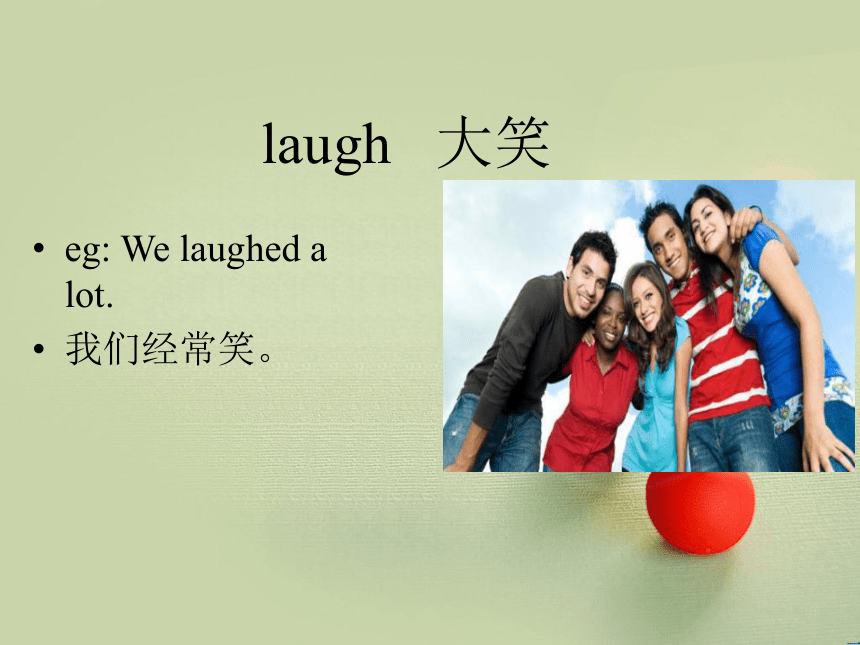

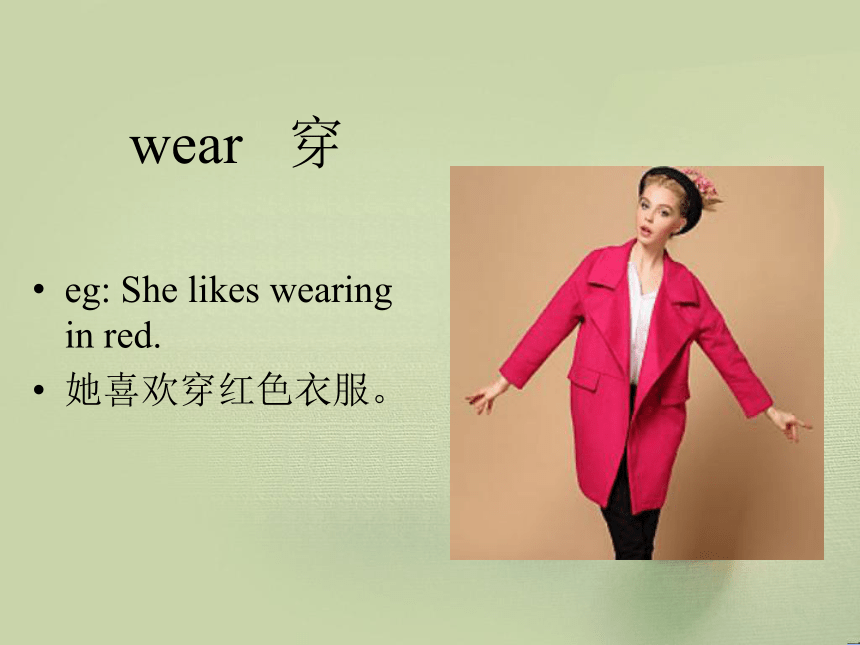
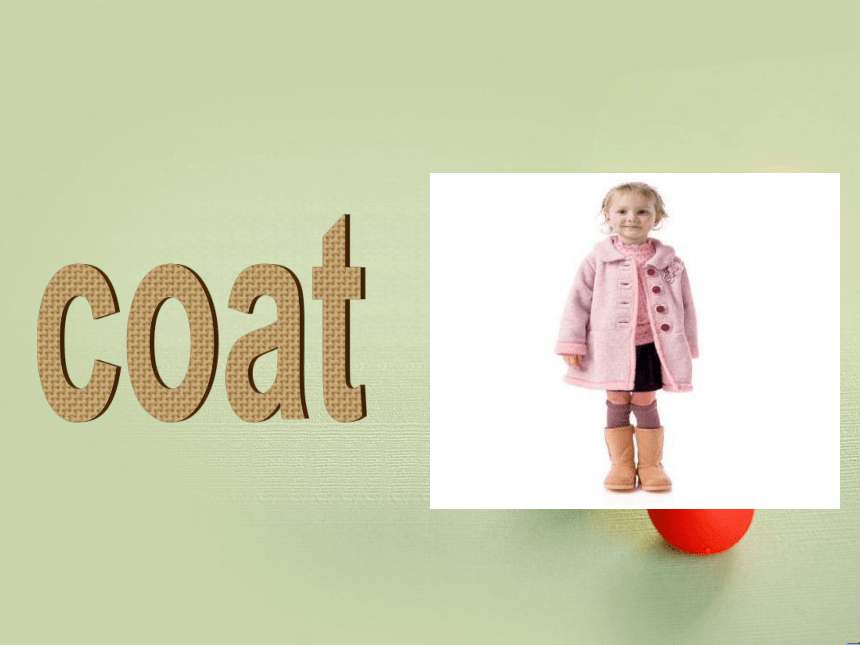
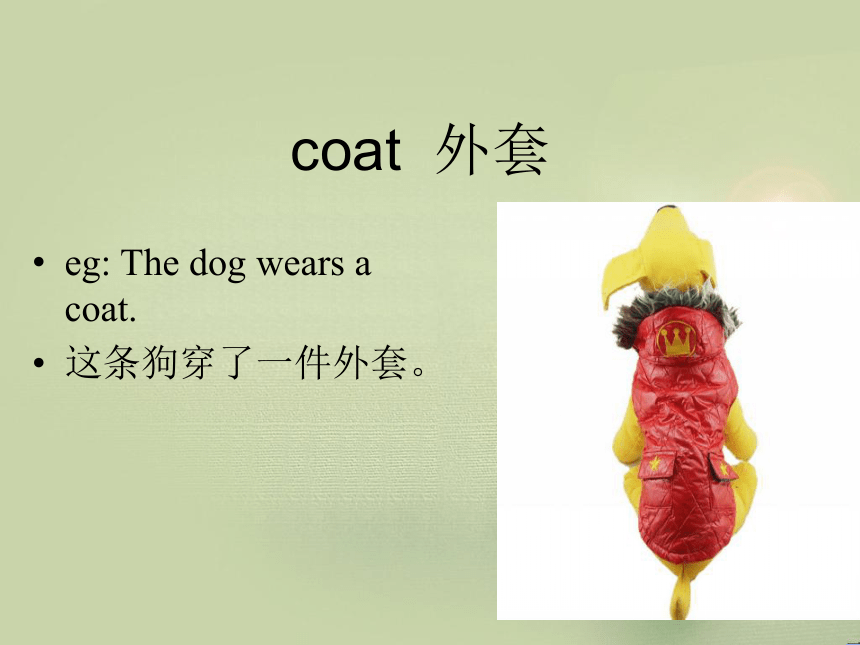
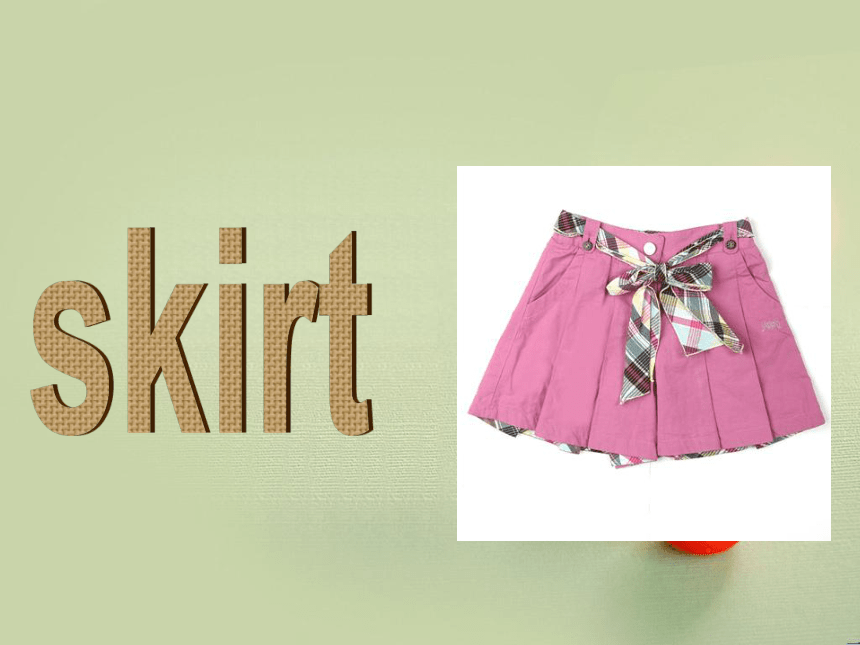


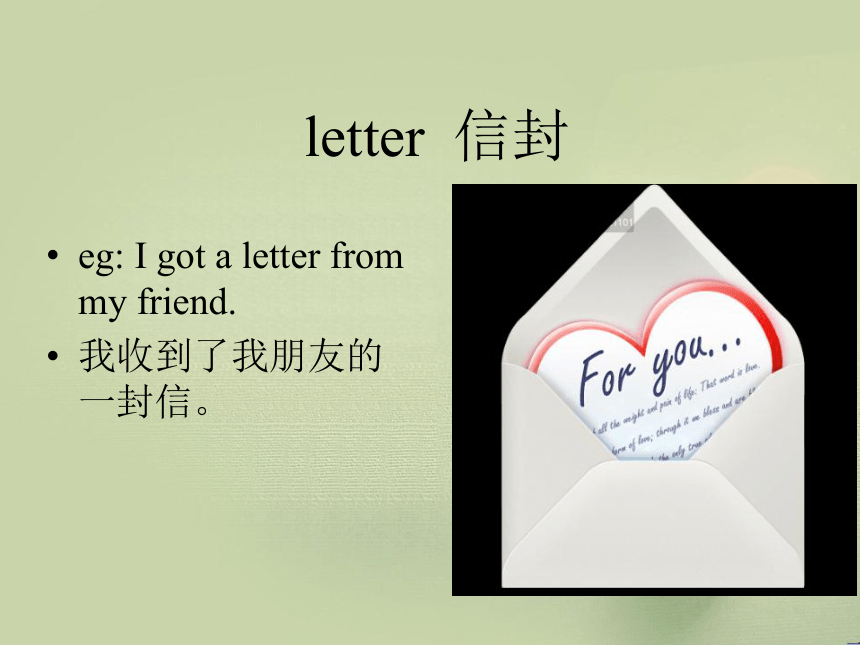
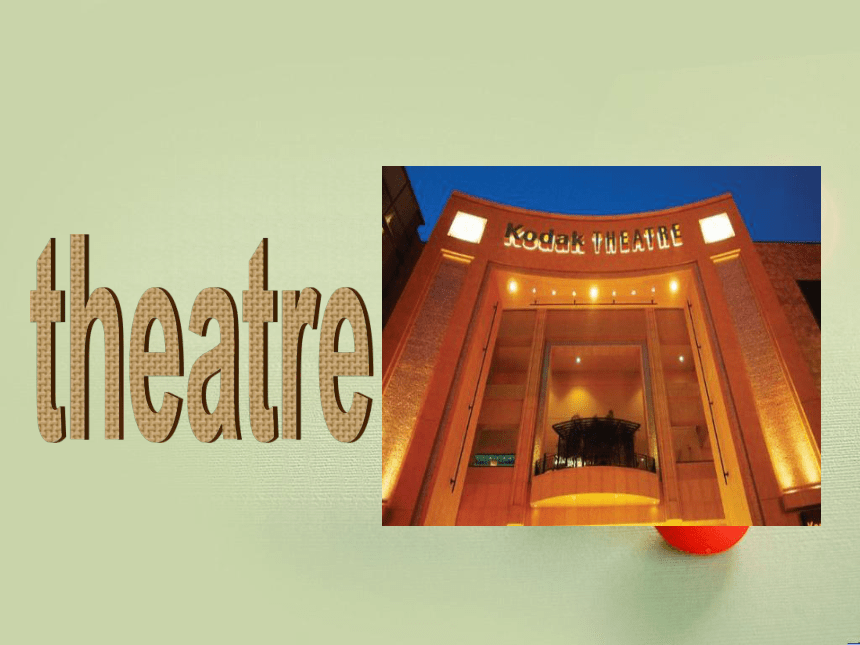
文档简介
课件52张PPT。Unit 1
We laughed a lot.laugh单词laugh 大笑eg: We laughed a lot.
我们经常笑。
wearwear 穿eg: She likes wearing in red.
她喜欢穿红色衣服。coatcoat 外套eg: The dog wears a coat.
这条狗穿了一件外套。skirtskirt 裙子eg: Most girls like skirts.
大部分女生都喜欢裙子。
letterletter 信封eg: I got a letter from my friend.
我收到了我朋友的一封信。
theatretheatre 电影院,戏院eg: Last week, we went to children theatre.
上个星期我们去了儿童剧院。
restaurantrestaurant 餐馆eg: I'm hungry so I will go to a restaurant.
我饿了,所以要去餐馆了。
Look, listen and sayAmy: I saw a dog. It wore a coat.
Sam: I saw a dog. It wore a hat.
Lingling: I saw a man. He wore a skirt.Listen and read Daming: Wow! I've got two letters in English! One is from the UK and one is from the US.
15 Marling Street
London, NW2
UK
Dear Daming,
Last week we went to a children’s theatre. The men wore women’s clothes. The women wore men’s clothes. The actors told lots of jokes. It was very funny. We laughed a lot. Children here love the theatre.
After the show we went to a restaurant.
We all ate hamburgers and chips.
Are you ready for your trip to the US?
Love,
LinglingListen and sayWe went to a children’s theatre.
The actors told lots of jokes.
We laughed a lot.Listen and sayLook, ask and answer.A:What did they do last week?
B:They played football.A:What did they do last week?
B:They went swimming.A:What did they do last week?
B:They flew kites.A: What did they do last week?
B:They visited the Great Wall.A:What did they do last week?
B:They went to the cinema.A:What did they do last week?
B:They went to the zoo. What’s this? It’s a theatre.What’s this?Are they men or women?They are men.
They wore women’s clothes.Are they men or women?They are women.They wore men’s clothes.Are they men or women?Who are they?They are actors.Who are they?What did they do?They told lots of jokes.Was it funny?And we laughed a lot.Yes, it was.Where did they go after the show?They went to a restaurant.What did they eat?They ate hamburgers and chips.一般过去式知识点复习I ___ 12 years old this year. 我去年11岁.I ____ 11 years old last year.He ____ in Beijing now.他昨天在上海。He ____ in Shanghai yesterday.他现在在北京。Please look at the sentences.我今年12岁.amwasiswasThey ____ in China today.他们今天在中国。They ____ in Japan yesterday.他们昨天在日本。areweream/ iswasarewere每天,早餐我吃鸡蛋和牛奶。I ____ eggs and milk for breakfast every morning.昨天,早餐我吃面条。I ____ noodles for breakfast yesterday morning.他每天都吃水果。He _____ fruit every day.昨天他吃了3个苹果。He _____ 3 apples yesterday.have/ hashadhavehashadhadI get up at 6:30 every morning.
I ___ up at 9:00 last Sunday.He plays football every afternoon.
He _____ basketball yesterday afternoon.He does his homework every evening.
He ____ some reading last night.动词原形、第三人称单数动词过去式gotplayeddidThey don’t watch TV in the evening.
They _________ TV last night.She doesn’t play basketball after school.
She _________ basketball after school yesterday.Do you go to school on foot every day?
___ you __ to school on foot yesterday.Does he go to school by bus every day?
___ he ___to school by bus yesterday?don’t/ doesn’tdo/ doesdidn’tdiddidn’t watchdidn’t playDidDidgogo谓语构成1.动词 be
2.动词 have,has
3.助动词do,does
4.行为动词用过去式was,werehaddid一般过去时以动词的过去式来表示,没有人称和数的变化.(was,were除外)I went to school yesterday.
They went to school yesterday.一般过去时的谓语构成:由动词的过去式构成规则变化
1.一般加ed
2.以e结尾加d3.末尾只有一个辅音字母的重读闭音节词,先双写这个辅音字母,再加ed .work —workedchange — changedprefer —preferredstop —stopped4.以辅音字母加y 结尾的词,先改 y为 i,再加ed
study — studied5.不规则变化.1.在过去某一时间内发生的动作:He got home at ten o’clock last night.2.表示过去经常或反复发生的动作,常与often,always等表示频度的 间状语连用:I often got up very early at that time.用法3.表示已故人所做的事情。Comrade Lei Feng did good deeds in his life. 雷锋同志做了一生的好事。4. 表示过去所发生的一系列的动作,而这一系列的动作是从现在的角度来考虑的,不是从动作相互之间的关系这一角度来考虑的。Miss Liu got up at seven o’clock this morning, dressed, had breakfast, and went to work.1.与ago 连用:
a moment
two minutes
three hours
five days
one week
six months
four yearsago用于一般过去时的时间状语(标志词)lasttime
night
week
month
term
Mondayyesterdaymorning
afternoon
eveningthe day before yesterday 2.与last 连用3.与yesterday 连用:4.与one 连用:onemorning
evening
day
Monday afternoon5.与that 连用:thatmorning
winter
day
yearjust now
in the old days
in those days
in 1980
the other day
at that time
once upon a time6.其他时间状语:行为动词一般过去时的否定式一般过去时的否定式是在动词原形前加助动词did not (didn’t).主语+didn’t+动词原形I _________ them the news.I ____ (tell) them the news yesterday.didn’t telltold行为动词一般过去时的疑问式一般过去时的一般疑问式在句首加助动词didDid+主语+动词原形……?They ______(finish) their work at four.
一般疑问句:____ they _____ their work at four?
Yes, they _____. No, they _____.finishedDidfinishdiddidn’t行为动词一般过去时的疑问式一般过去时的特殊疑问式疑问词+did+主语+动词原形……?They finished their work at four.AB 对划线部分提问
A:
B:What did they do at four?When did they finish their work?综上所述一般过去时:表示过去发生的动作或存在的状态。
表示过去的时间状语有:yesterday,the day before yesterday,last…,before,ago(……以前),this morning…
表示过去动作:What did you/he/she…do…?
I/He/She+动词过去式
Did you/he/she…+动词原形 ?
表示过去存在的状态:
I/He/She was in Canada. They/You/We were in Canada. It was clean./They were dirty.
一般过去式的定义 一般过去时表示过去某个时间里发生的动作或状态;过去习惯性、经常性的动作、行为;过去主语所具备的能力和性格。
所谓过去时间例有:昨天(yesterday)、一周前(one week ago)、昨天晚上(last night)等等。
基本形式为主语+动词过去式+其他谓语等。
否定形式:be动词直接在后面加not; 其他在行为动词前加didn’t, 同时还原行为动词.
本单元你学到了什么,快来总结一下吧!
We laughed a lot.laugh单词laugh 大笑eg: We laughed a lot.
我们经常笑。
wearwear 穿eg: She likes wearing in red.
她喜欢穿红色衣服。coatcoat 外套eg: The dog wears a coat.
这条狗穿了一件外套。skirtskirt 裙子eg: Most girls like skirts.
大部分女生都喜欢裙子。
letterletter 信封eg: I got a letter from my friend.
我收到了我朋友的一封信。
theatretheatre 电影院,戏院eg: Last week, we went to children theatre.
上个星期我们去了儿童剧院。
restaurantrestaurant 餐馆eg: I'm hungry so I will go to a restaurant.
我饿了,所以要去餐馆了。
Look, listen and sayAmy: I saw a dog. It wore a coat.
Sam: I saw a dog. It wore a hat.
Lingling: I saw a man. He wore a skirt.Listen and read Daming: Wow! I've got two letters in English! One is from the UK and one is from the US.
15 Marling Street
London, NW2
UK
Dear Daming,
Last week we went to a children’s theatre. The men wore women’s clothes. The women wore men’s clothes. The actors told lots of jokes. It was very funny. We laughed a lot. Children here love the theatre.
After the show we went to a restaurant.
We all ate hamburgers and chips.
Are you ready for your trip to the US?
Love,
LinglingListen and sayWe went to a children’s theatre.
The actors told lots of jokes.
We laughed a lot.Listen and sayLook, ask and answer.A:What did they do last week?
B:They played football.A:What did they do last week?
B:They went swimming.A:What did they do last week?
B:They flew kites.A: What did they do last week?
B:They visited the Great Wall.A:What did they do last week?
B:They went to the cinema.A:What did they do last week?
B:They went to the zoo. What’s this? It’s a theatre.What’s this?Are they men or women?They are men.
They wore women’s clothes.Are they men or women?They are women.They wore men’s clothes.Are they men or women?Who are they?They are actors.Who are they?What did they do?They told lots of jokes.Was it funny?And we laughed a lot.Yes, it was.Where did they go after the show?They went to a restaurant.What did they eat?They ate hamburgers and chips.一般过去式知识点复习I ___ 12 years old this year. 我去年11岁.I ____ 11 years old last year.He ____ in Beijing now.他昨天在上海。He ____ in Shanghai yesterday.他现在在北京。Please look at the sentences.我今年12岁.amwasiswasThey ____ in China today.他们今天在中国。They ____ in Japan yesterday.他们昨天在日本。areweream/ iswasarewere每天,早餐我吃鸡蛋和牛奶。I ____ eggs and milk for breakfast every morning.昨天,早餐我吃面条。I ____ noodles for breakfast yesterday morning.他每天都吃水果。He _____ fruit every day.昨天他吃了3个苹果。He _____ 3 apples yesterday.have/ hashadhavehashadhadI get up at 6:30 every morning.
I ___ up at 9:00 last Sunday.He plays football every afternoon.
He _____ basketball yesterday afternoon.He does his homework every evening.
He ____ some reading last night.动词原形、第三人称单数动词过去式gotplayeddidThey don’t watch TV in the evening.
They _________ TV last night.She doesn’t play basketball after school.
She _________ basketball after school yesterday.Do you go to school on foot every day?
___ you __ to school on foot yesterday.Does he go to school by bus every day?
___ he ___to school by bus yesterday?don’t/ doesn’tdo/ doesdidn’tdiddidn’t watchdidn’t playDidDidgogo谓语构成1.动词 be
2.动词 have,has
3.助动词do,does
4.行为动词用过去式was,werehaddid一般过去时以动词的过去式来表示,没有人称和数的变化.(was,were除外)I went to school yesterday.
They went to school yesterday.一般过去时的谓语构成:由动词的过去式构成规则变化
1.一般加ed
2.以e结尾加d3.末尾只有一个辅音字母的重读闭音节词,先双写这个辅音字母,再加ed .work —workedchange — changedprefer —preferredstop —stopped4.以辅音字母加y 结尾的词,先改 y为 i,再加ed
study — studied5.不规则变化.1.在过去某一时间内发生的动作:He got home at ten o’clock last night.2.表示过去经常或反复发生的动作,常与often,always等表示频度的 间状语连用:I often got up very early at that time.用法3.表示已故人所做的事情。Comrade Lei Feng did good deeds in his life. 雷锋同志做了一生的好事。4. 表示过去所发生的一系列的动作,而这一系列的动作是从现在的角度来考虑的,不是从动作相互之间的关系这一角度来考虑的。Miss Liu got up at seven o’clock this morning, dressed, had breakfast, and went to work.1.与ago 连用:
a moment
two minutes
three hours
five days
one week
six months
four yearsago用于一般过去时的时间状语(标志词)lasttime
night
week
month
term
Mondayyesterdaymorning
afternoon
eveningthe day before yesterday 2.与last 连用3.与yesterday 连用:4.与one 连用:onemorning
evening
day
Monday afternoon5.与that 连用:thatmorning
winter
day
yearjust now
in the old days
in those days
in 1980
the other day
at that time
once upon a time6.其他时间状语:行为动词一般过去时的否定式一般过去时的否定式是在动词原形前加助动词did not (didn’t).主语+didn’t+动词原形I _________ them the news.I ____ (tell) them the news yesterday.didn’t telltold行为动词一般过去时的疑问式一般过去时的一般疑问式在句首加助动词didDid+主语+动词原形……?They ______(finish) their work at four.
一般疑问句:____ they _____ their work at four?
Yes, they _____. No, they _____.finishedDidfinishdiddidn’t行为动词一般过去时的疑问式一般过去时的特殊疑问式疑问词+did+主语+动词原形……?They finished their work at four.AB 对划线部分提问
A:
B:What did they do at four?When did they finish their work?综上所述一般过去时:表示过去发生的动作或存在的状态。
表示过去的时间状语有:yesterday,the day before yesterday,last…,before,ago(……以前),this morning…
表示过去动作:What did you/he/she…do…?
I/He/She+动词过去式
Did you/he/she…+动词原形 ?
表示过去存在的状态:
I/He/She was in Canada. They/You/We were in Canada. It was clean./They were dirty.
一般过去式的定义 一般过去时表示过去某个时间里发生的动作或状态;过去习惯性、经常性的动作、行为;过去主语所具备的能力和性格。
所谓过去时间例有:昨天(yesterday)、一周前(one week ago)、昨天晚上(last night)等等。
基本形式为主语+动词过去式+其他谓语等。
否定形式:be动词直接在后面加not; 其他在行为动词前加didn’t, 同时还原行为动词.
本单元你学到了什么,快来总结一下吧!
同课章节目录
- Module 1
- Unit 1 We lived in a small house.
- Unit 2 She didn't have a television.
- Module 2
- Unit 1 She learnt English.
- Unit 2 Mr Li was a teacher.
- Module 3
- Unit 1 She had eggs and sausages.
- Unit 2 Sam ate four hamburgers.
- Module 4
- Unit 1 Let's make a home library.
- Unit 2 We can find information from books and CDs.
- Module 5
- Unit 1 It's big and light.
- Unit 2 It's too big for you.
- Module 6
- Unit 1 I went there last year.
- Unit 2 She visited the Tianchi Lake.
- Module 7
- Unit 1 My father goes to work at eight o'clock eve
- Unit 2 I'll be home at seven o'clock.
- Module 8
- Unit 1 Will you help me?
- Unit 2 I made a kite.
- Module 9
- Unit 1 We laughed a lot.
- Unit 2 Mum bought new T-shirts for you.
- Module 10
- Unit 1 Where are you going to go?
- Unit 2 I'm in New York now.
- Review Module
- Unit 1
- Unit 2
